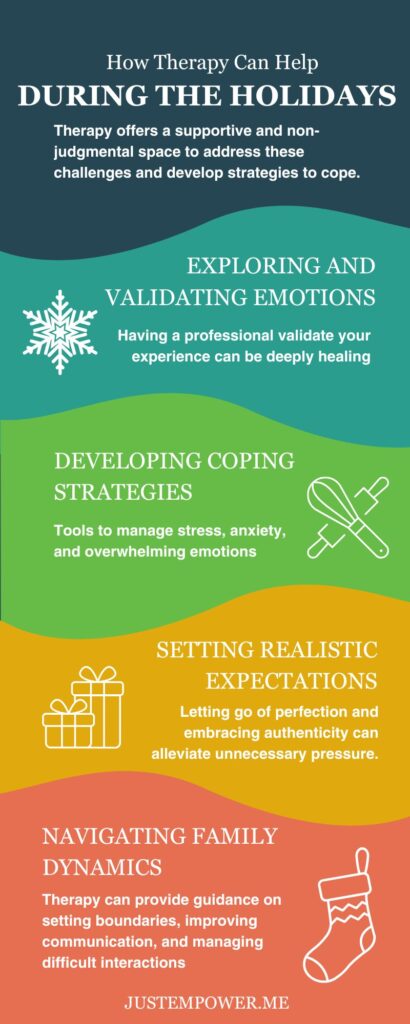
The holiday season is often portrayed as a time of joy, connection, and celebration yet grief during the holidays is common. For many, it’s a period filled with traditions, festive gatherings, and time spent with loved ones.
But the reality isn’t always as picturesque as a Hallmark movie. For some, the holidays can bring about feelings of stress, anxiety, and even grief, making this time of year emotionally complex.
If you’ve found yourself dreading the holidays or feeling overwhelmed by the pressures they bring, you’re not alone. Therapy can be a powerful tool to help you navigate these challenges, foster resilience, and empower you to create a more balanced and meaningful holiday experience.
Why the Holidays Can Feel Stressful or Overwhelming
While the holiday season comes with its unique joys, it also introduces a host of emotional stressors that can impact mental well-being. Understanding these dynamics is the first step in managing them effectively. Let’s explore some common challenges people face during this time:
1. Heightened Expectations
The media and societal norms often frame the holidays as a time of unrelenting joy and togetherness. However, this idealized narrative can create pressure to conform, leaving many feeling inadequate or disappointed if their experience doesn’t match up.
2. Family Dynamics
For some, spending time with family is a highlight of the season. But for others, family gatherings can bring unresolved conflicts, strained relationships, or the absence of loved ones, which may lead to feelings of stress, sadness, or nostalgia.
3. Financial Strain
Gift-giving, travel expenses, and hosting holiday gatherings can strain even the most carefully planned budgets. The financial stress of meeting these expectations can weigh heavily on mental health.
4. Social Isolation
Not everyone has a close-knit family or community to celebrate with during the holidays. For those experiencing loneliness or isolation, the season’s emphasis on connection can exacerbate feelings of disconnection.
5. Grief and Loss
For individuals who have lost loved ones, the holidays can serve as a poignant reminder of what’s missing. Memories of happier times or traditions shared with those no longer present can intensify feelings of grief.
How Therapy Can Help During the Holidays
Therapy offers a supportive and non-judgmental space to address these challenges and develop strategies to cope. Here’s how working with a therapist can make a difference:
1. Exploring and Validating Emotions
Therapists provide a safe space for you to explore the complex mix of emotions the holidays can bring. Whether you’re feeling joy, sadness, or a little of both, having a professional validate your experience can be deeply healing.
2. Developing Coping Strategies
Therapy equips you with tools to manage stress, anxiety, and overwhelming emotions. Mindfulness exercises, grounding techniques, and stress management tools can help you stay centered amidst the holiday hustle.
3. Setting Realistic Expectations
Therapists can help you examine the expectations you hold for the holiday season and adjust them to reflect your reality. Letting go of perfection and embracing authenticity can alleviate unnecessary pressure.
4. Navigating Family Dynamics
If family gatherings are a source of stress, therapy can provide guidance on setting boundaries, improving communication, and managing difficult interactions. A therapist can help you identify strategies to maintain your emotional well-being while navigating family complexities.
5. Grief Support
For those grappling with loss, therapy offers a space to process and express grief in meaningful ways. A therapist can also help you find ways to honor your loved ones during the holidays, creating new rituals that bring comfort.
If you are in crisis and need to speak with someone urgently, the 988 Lifeline is a available 24/7 by phone, text, or chat.
6. Encouraging Self-Care
Sensory dysregulation tends to ramp up this time of year. Between the holiday lights and sounds, disruptions in routine, and the demands of keeping up with social expectations, it’s no wonder you may be feeling more stressed and anxious than usual.
It’s important to be proactive with prioritizing your needs, especially when you anticipate additional stress and anxiety during the holidays. Therapy sessions can focus on creating a self-care plan that nurtures your mental, emotional, and physical well-being throughout the holiday season.
Your therapist may encourage you to dedicate time for yourself to unwind and decompress. This may look like taking a 10 minute walk outside before your family arrives or releasing your thoughts in a journal each night.
Let’s talk through some other practical tips you can incorporate into your routine to help alleviate some of the stress you feel around the holiday season
 .
.
Practical Tips for Managing Holiday Stress and Anxiety
While therapy can provide long-term benefits, there are also steps you can take on your own to ease holiday-related stress. Here are some actionable strategies to help you feel more grounded:
1. Set Clear Boundaries
Boundaries are essential for protecting your energy and maintaining healthy relationships. Clearly communicate what you’re comfortable with—whether it’s avoiding certain topics, limiting your time at gatherings, or saying no to invitations that feel overwhelming.
2. Create Meaningful Rituals
If traditional holiday activities feel burdensome, consider creating new rituals that align with your values and bring you joy. This could be as simple as lighting a candle in honor of a loved one, volunteering, or taking a quiet walk on a winter morning.
3. Practice Mindfulness
Mindfulness techniques like deep breathing, meditation, or grounding exercises can help you stay present and manage holiday stress. Even a few minutes of mindfulness each day can make a significant difference.
4. Plan Ahead
If you know certain situations may be challenging, create a plan in advance. This might include scheduling breaks during family visits, budgeting for gifts to avoid financial strain, or having a list of conversation topics to steer discussions in a positive direction.
5. Reach Out for Support
Don’t hesitate to lean on your support system, whether it’s friends, family, or a therapist. Sharing your feelings and experiences can help you feel less alone.
6. Prioritize Rest and Relaxation
Amid the busyness of the season, prioritize downtime to recharge. This could be through reading a book, taking a warm bath, or engaging in a hobby that brings you peace.
7. Give Yourself Permission to Say No
It’s okay to decline invitations or step away from traditions that no longer serve you. Saying no is a powerful way to honor your needs and preserve your mental health.
Creating Your Own Holiday Traditions That Support Your Mental Health
Remember, the holiday season doesn’t have to look a certain way. It’s a deeply personal experience, and there’s no one-size-fits-all approach to navigating it. By prioritizing your well-being, setting boundaries, and seeking support when needed, you can redefine what the holidays mean for you.
If you’re in the Hazlet, NJ area, or anywhere in New Jersey, and are searching for a therapist to help you navigate this time of year, we’re here to support you. Therapy can provide the tools and insights you need to manage holiday stress and find moments of peace and joy amidst the chaos.
Schedule a session with one of our compassionate therapists today, and take the first step toward a more balanced and fulfilling holiday season. You deserve it. Please reach out by calling 855-500-3848 EXT 4 or emailing [email protected] to set up an appointment with one of our grief and trauma therapists.
